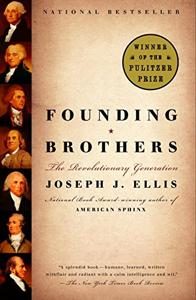
Want to learn the ideas in Founding Brothers better than ever? Read the world’s #1 book summary of Founding Brothers by Joseph J. Ellis here.
Read a brief 1-Page Summary or watch video summaries curated by our expert team. Note: this book guide is not affiliated with or endorsed by the publisher or author, and we always encourage you to purchase and read the full book.
Video Summaries of Founding Brothers
We’ve scoured the Internet for the very best videos on Founding Brothers, from high-quality videos summaries to interviews or commentary by Joseph J. Ellis.
1-Page Summary of Founding Brothers
Overall Summary
Preface
The American Revolution was inevitable because it seemed impossible at the time. The people involved in the revolution were aware that they were part of a historical movement and claimed to be “present at the creation” (John Adams). They established liberal principles that are still in place today, which have been followed by many other revolutions around the world.
Revolutionary leaders may have been confident, but their values were still developing in the 1770s. Military historians believe that if British commanders had been more aggressive at the beginning of the Revolution, they would have succeeded in stifling it and executed its signers for treason. It was not inevitable that America achieved independence from Britain during this time; it could have happened gradually instead. American institutions created during this time are still used to govern today’s society.
The American Revolution was unprecedented in many ways. It was the first time a republic had successfully governed such an extensive territory, and it involved people from different regions who did not have much unity at that time. Hindsight is tricky because we can only see what happened after the fact; however, Ellis suggests that we should use hindsight to understand both perspectives of those living during this revolutionary period while also understanding our current perspective.
In the past, we’ve looked back on America’s abundant natural resources and seen them as a source of endless potential. Now that we have more time to think about it, though, we realize that there was a problem with this idea: The same argument against centralized government could also be used to criticize the new American government. It seemed likely that America would split into different parts because of its size and conflicts between states.
The Constitution wasn’t created by a few political leaders, but rather it was the result of a miracle that solved some unsolvable problems. The Founding Fathers managed to create an effective federal government that stayed true to American values. This event marked the beginning of another phase in America’s history and is thus called another “Founding Moment.”
The Constitutional Convention was a time of uncertainty. Compromises were made to appease opposing interests and issues were approached in vague ways to avoid conflict. At the time, the word “American” was used as an insult. In 1789, after George Washington became the first president, he met with his government to decide important things about America’s future.
It was unclear whether the United States would be able to govern such a large country with a republican form of government. It remained to be seen if there would be an American identity and sense of unity, especially since many people in the South owned slaves.
The Founding Fathers were the most crucial and consequential people in American history. Issues ranging from the Civil War to the growth of American imperial domination in the twentieth century had their origins in this period. People both idolize and vilify them because we are still living with their legacy today.
Historians have been focusing on the lives of ordinary people in order to tell the story of revolutionary times. Ellis, however, believes that it’s important to focus on the leaders from those times because they created American institutions that are still around today. The relationship between these men was often tumultuous but also close.
The Founding Fathers were all white men, and they would not have been able to rise in the political system of England. They were very much American, as they were “America’s first natural aristocracy.” One school of thought says that the Revolution was a radical assertion against European corruption, while another suggests that it was more about collective action for the good of America than individual rights.





